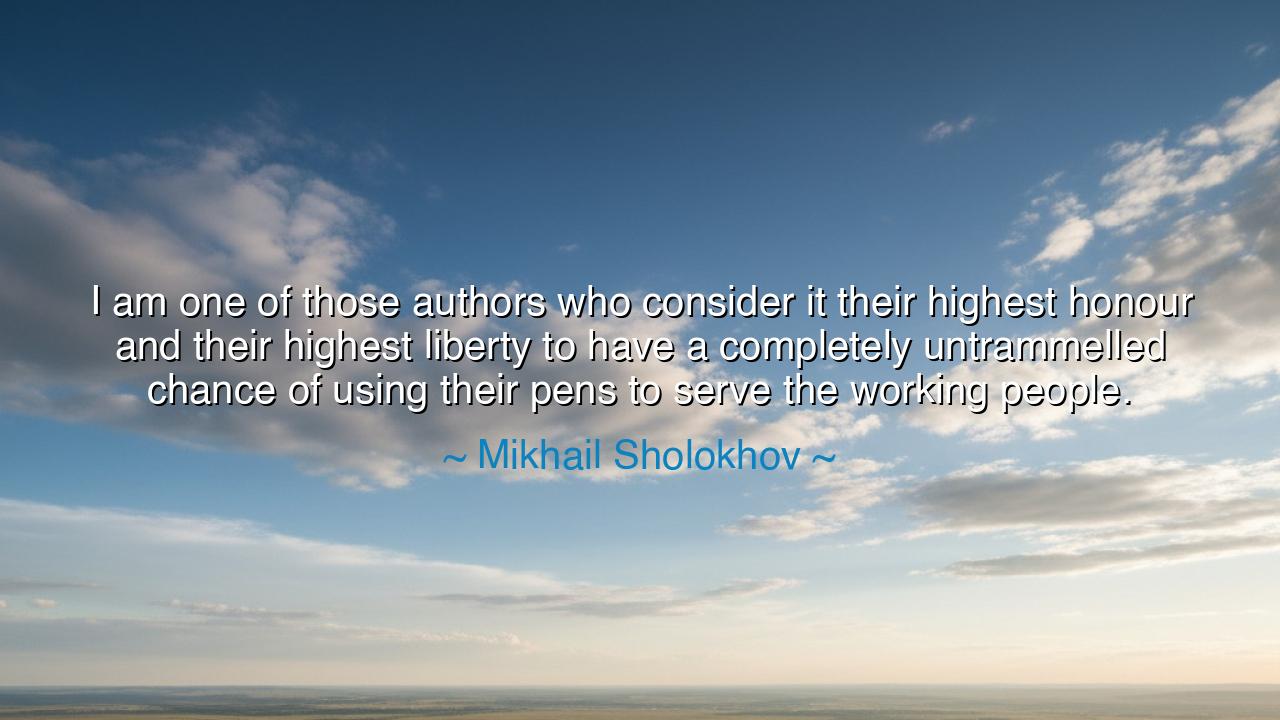
I am one of those authors who consider it their highest honour
I am one of those authors who consider it their highest honour and their highest liberty to have a completely untrammelled chance of using their pens to serve the working people.






In the hearts of great authors, there burns a deep and powerful conviction: the pen is not just a tool for personal expression, but a weapon of liberation, a means by which one can stand for justice and give voice to those who have long been silenced. Mikhail Sholokhov’s words, “I am one of those authors who consider it their highest honour and their highest liberty to have a completely untrammelled chance of using their pens to serve the working people,” echo this very sentiment, recognizing the unique privilege and responsibility that comes with the power of the written word. For Sholokhov, the author’s duty is clear: to use the pen not for personal gain or vanity, but to serve the masses, to shed light on the struggles of those who toil in silence, and to give voice to the oppressed.
The ancients understood the power of the written word in shaping societies, and often, it was the role of the philosopher or poet to serve as the conscience of the people. Homer, for example, did not merely tell the stories of gods and heroes for entertainment; he used his epic poetry to convey deeper truths about the human condition, to inspire courage and wisdom, and to critique the societies in which he lived. Just as Homer’s Iliad and Odyssey guided the ancient Greeks toward virtue, so too did Sholokhov see his writing as a way to serve and uplift the working people of his time. In this, both Homer and Sholokhov were servants of the truth, using their words not to glorify themselves, but to speak for those whose voices were drowned out by the noise of the powerful.
Consider the story of Victor Hugo, whose masterpiece Les Misérables immortalized the plight of the poor and downtrodden in French society. Hugo, like Sholokhov, used his pen to speak out against injustice and to bring attention to the suffering of the masses. His novel was not merely a work of fiction; it was a call to action, urging readers to recognize the humanity of the oppressed and to stand against the systems that sought to keep them in subjugation. Hugo’s words resonated with people across generations because they did not merely entertain; they challenged society’s deepest assumptions and demanded that the marginalized be seen and heard. Hugo, too, saw writing as a sacred duty, a privilege, and an opportunity to serve the people.
Sholokhov’s understanding of writing as a tool for service and liberation aligns with the ideals of the Russian literary tradition. Authors like Leo Tolstoy and Fyodor Dostoevsky also used their pens not for self-glorification but for spiritual and social commentary, seeking to expose the moral and ethical struggles within Russian society. Tolstoy’s War and Peace and Anna Karenina, and Dostoevsky’s Crime and Punishment are profound meditations on the human soul, and both authors sought to lift up the common man through their exploration of societal and individual struggles. Sholokhov, too, sought to capture the suffering and resilience of the working class in his works, particularly in his monumental novel And Quiet Flows the Don, where he portrayed the lives of Cossacks in the context of the Russian Revolution.
Sholokhov’s commitment to serving the working people through literature is a call to action for all writers and thinkers: to recognize that with privilege comes responsibility, and with the power of words comes the opportunity to enlighten, to challenge, and to serve. Writing, when used wisely, has the power to transcend personal ego and become a force for social good, for it can shine a light on injustice, bring attention to the voiceless, and ignite change in society. As writers, our task is not to merely entertain or gain fame, but to contribute meaningfully to the world around us, to use our words to create a more just and equitable world.
The lesson here is one of purpose and duty. Just as Sholokhov saw his writing as a tool for service, so too must we approach our own lives with a sense of responsibility. Whether through art, activism, or daily action, we must ask ourselves how we can use our talents, our abilities, and our voices to serve the greater good. The privilege of speaking, writing, or creating comes with the responsibility to stand up for those who have no voice, to give light to the darkest corners of society, and to work towards a world where dignity, justice, and freedom are not luxuries, but rights.
As we navigate our own paths, let us take inspiration from Sholokhov, Hugo, and the great authors of history, who used their talents not for fame, but to serve and uplift others. Let us ask ourselves, as writers, artists, or citizens, how we can use our gifts to serve the people, to bring forth justice, and to ensure that our works resonate with truth, honor, and compassion. When we live with this sense of duty, we become not just creators, but servants of something greater than ourselves, and in doing so, we honor the very purpose of our work.






AAdministratorAdministrator
Welcome, honored guests. Please leave a comment, we will respond soon